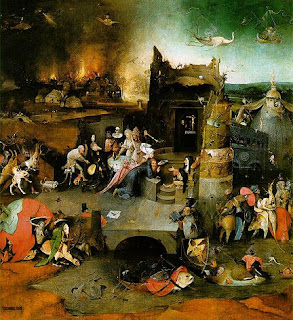"It's not celibacy itself that is a higher state, but the nonpossessive attitude of true humility or purity of heart that, under ideal circumstances, is associated with it. The goal is purity of heart, or what Desert Fathers and Mothers describe as that humility that is the accpetance of all reality about ourselves and God, and accpetance also of our own weakness and helplessness.
 |
| Matisse_Dance |
The commitment to celibacy as a state of life isn't the only feature of monastic life, but it's one of several commitments, all of which are considered to be equally supportive and essential to the transformative process. Celibacy needs to be presented not in isolation but as part of a larger package, an especially with the interior purpose or intention of getting closer to God.
It has only become clearer that it's a gift of God and that the practice of it is entirely dependent on God's power and mercy. And as one matures in lifelong commitment to celibacy, there's a whole set of attitudes toward God that begin to emerge, as a result of a movement from formal commitment to direct experience, from friendship with God to union with God.
So the celibate commitment is not just about chastity. It's about being more and more present to others, in service to ohters, and trying to bring a quality to the details of daily life that manifests, in everything we do, the unconditional love of God and even the tenderness of God. The sexual energy is transmuted in this way into an ever-greater energy in service to others and in the search for God. It's not an end in itself, in other words, but a way of life that has to make's God's love visible in the community or wherever onde decides to live the celibate life. Without that inner purification, celibacy is an external observance rather that a interior practice thta supports authentic transformation. When it's channeled, through devotion to God and service to others, this energy begins to emerge, especially during meditative practices in a differnt form; it's transformed or transmutted into higher possibilities of energy for use in seeking God's presence, which isn't an easy path.I think sexuality is a positive virtue, and it's a hazard in celibacy only if one denies it and then represses one's feelings instead of integrating them into the whole evolving development onf one's faculties. [related to sexuality] Negative or positive, they're just responses to instinct, and a human being is more than just instinct
Now this doesn't exclude friendship, which is very important n supporting a celibate commitment, but it does imply a discipline that filters out of that growing intimacy with another the genital attraction that may be there, and which is perfectly normal if it is there. But one ought not to conclude from this that genuiely spiritual frienship must exclude all warmth or emotion; it is only those excessive marks of affection that lead to deep sensuality or action out that have to be sacrificed, not friendship itself. Celibacy should never be practiced in isolation from other pratices that strenghten community relations, such as devotion, such as realfriendship, and the kind of intimacy that seeks no reward but the hapinness of the other person.
Its fulfillment is certainly going to take some time, and there are going to be rough spots, and not everybody's going to make it: there are going to be some failures. anybody who's been through those dark nights will not judge anybody's failures."
Father Thomas Keating (Trappist monk) / 2001


